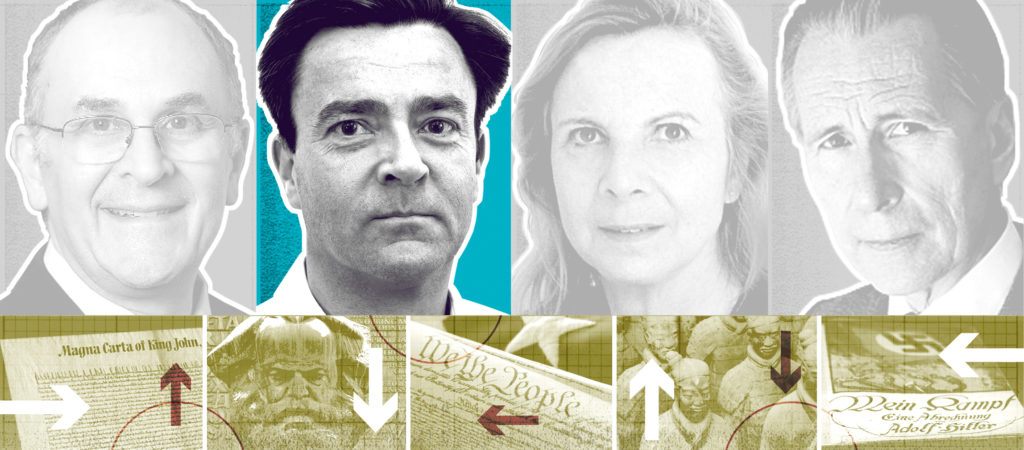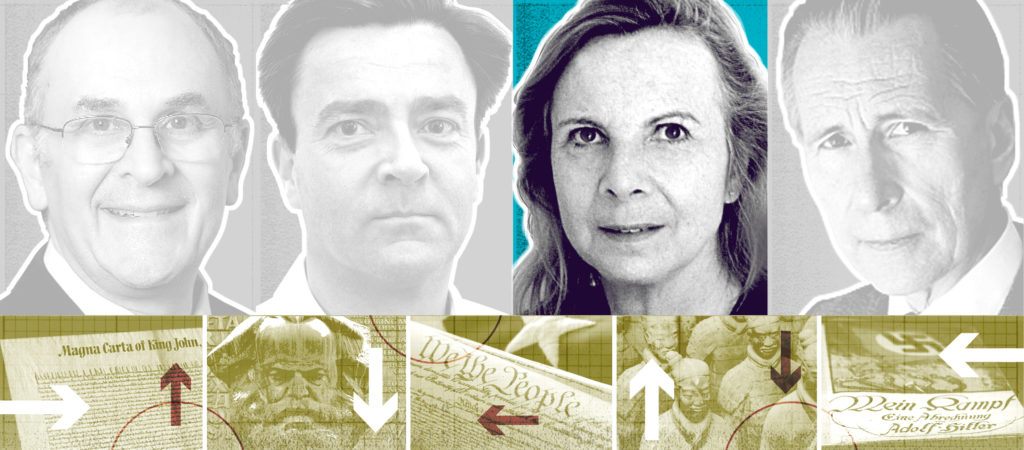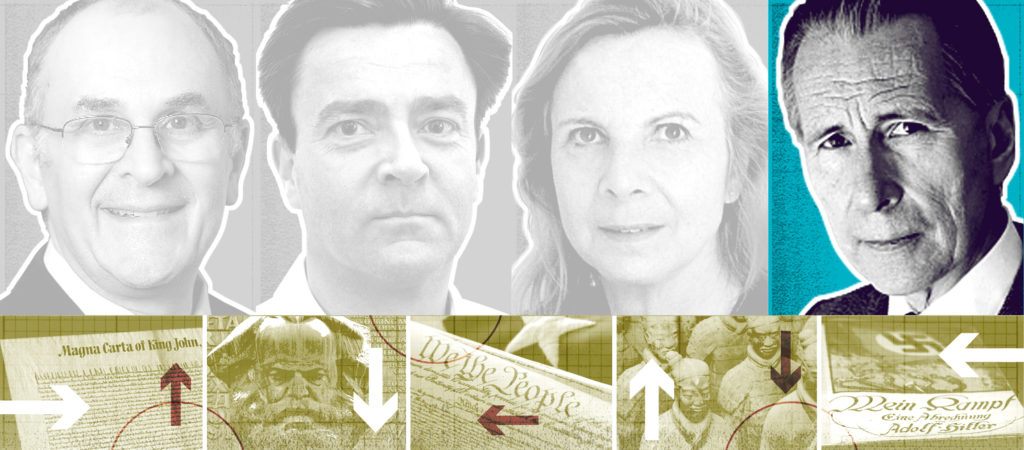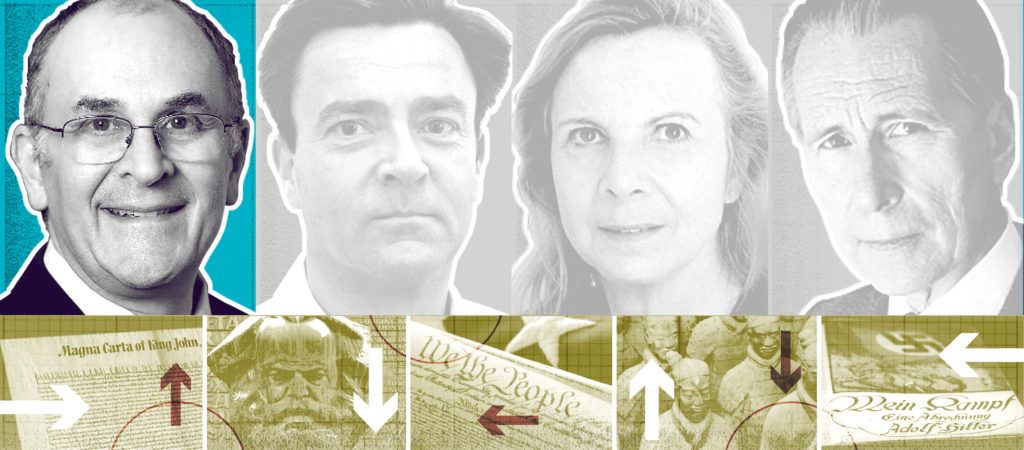Can we count on democracy to prevail? Credit: PA Images
The last time the UnHerd History Jury met, it was to consider the events of 2017, and to weight up their future importance. This time, the distinguished quartet convenes to consider the most dangerous ways in which we currently misperceive history.

Paul Lay
Until recently, I had assumed that democracy in the UK was safe and assured. That now feels like a misperception and, for obvious reasons, a perilous one. Ultimately, democracy depends on those on both sides of the political divide – and in the UK, historically, we tend to view politics though a binary lens – being ready to lose. Yet, for the first time in my lifetime, intelligent, decent democrats, such as Lord (Andrew) Adonis and Professor A.C. Grayling, among others, are calling this consensus into question.
This is particularly ironic given the celebrations in the UK of the centenary of suffrage for (some) women and all men. The suggestion that a Brahmin class knows best argues against the general belief in the stress-tested wisdom of a British electorate, which rarely gets things wrong and remains supremely un-ideological.
It is worth recalling, though, some of the reasons women got the vote in the first place. Certain politicians argued that women, particularly those from the upper and middle classes who got the vote in 1918, would act as a counterweight to the socialist demands expected from the newly enfranchised male working classes. And they were right, so much so that all women were given the vote by a Conservative government a decade later.
Cynicism is one thing, however. Nihilism, quite another.

Victoria Schofield
The idea that the United Nations ever had any mandatory authority to resolve the conflict between India and Pakistan over the disputed state of Jammu and Kashmir is a dangerous one. For 70 years, the bogey of potential UN involvement has hung over the conflict between those two nuclear neighbours, India and Pakistan.
There are those (mainly in Pakistan) who support the UN’s involvement, believing that it has the authority to hold a plebiscite in Jammu and Kashmir, there are those (mainly in India) who reject the UN’s involvement because they think it would force a referendum or plebiscite on the state, whose outcome might prove unacceptable to India’s national interest.
But both viewpoints are incorrect. The belief that the UN resolutions (passed in 1948 and 1949) which urged the holding of a plebiscite in order to confirm or negate the state’s temporary accession to India, had any mandatory authority, is misplaced. The resolutions were only ever recommendations which outlined certain measures that both countries should undertake before a plebiscite could be held. Once one or other government reneged on its commitments, the UN had no authority to force that country either to hold a plebiscite.
By misunderstanding the UN’s role, alternative avenues for resolution have been not been sufficiently explored. People in both countries have become frustrated and attitudes have hardened; in such a volatile situation, the potential for another military confrontation remains – most probably instigated by an act of terrorism using the unresolved dispute over Jammu and Kashmir as the pretext.

Allan Mallinson
The most troubling misperception for me is that the EU has been the both the builder and the guarantor of peace in Europe.
In 2012, the EU was awarded the Nobel Peace Prize for its contribution over six decades to “the advancement of peace and reconciliation, democracy and human rights in Europe”, and being instrumental in “transforming most of Europe from a continent of war to a continent of peace”. The problem with the award’s parameters – the prize is meant for those who have “done the most or the best work for fraternity between nations, for the abolition or reduction of standing armies and for the holding and promotion of peace congresses” – suggests that the EU’s contribution to peace has been greater than Nato’s. Indeed, that by not reducing its standing armies, Nato is itself endangering peace.
I have no difficulty with acknowledging the EU’s role in peacebuilding (a United Nations term), but the absolute guarantor has always been Nato. Article 5 of the North Atlantic Treaty stipulates that “an armed attack against one or more of [the members] in Europe or North America shall be considered an attack against them all…”, promising dire consequences for the perpetrator. To misunderstand this, wilfully or otherwise, is to exalt the EU to the point of hubris, and to denigrate Nato to the point of undermining Article 5 – which is precisely President Putin’s aim.

Eliot Cohen
So many misperceptions! The largest and most consequential though is the failure to accept contingency. It is difficult to study political or military history without concluding that things did not have to be the way they were. Commanders, diplomats, activists – all have their role to play, as does sheer accident. Abraham Lincoln stops a bullet in 1862 (and there were those trying to kill him) and the Civil War probably ends with two countries (at least) in what is now the United States. Halifax becomes Prime Minister in 1940, as he wished and Neville Chamberlain, not to mention the largest bloc in the Conservative Party, would have preferred, and it is difficult to believe that Britain would have avoided a peace treaty, or at least a substantial truce, with Nazi Germany.
There is a tendency in our age to think in structural terms about trends and underlying facts, and there is something to that. Particularly in democracies, crowds matter. All of us witness large phenomena – the spread of personal digital assistants, for example – that no one really can control. Big data is the absorbing interest of the moment. But it is still the case that particular people make a difference. A Kagame or an Erdogan are consequential people – a Trump, Putin, or Xi Jinping even more so.
And sometimes things blow up. There may have been structural preconditions for the so-called Arab Spring, but surely it mattered that a fruit seller in Tunis was so maddened by desperation and rage that he set himself on fire. There is a danger that we will forget just how contingent events can be. In this centennial of World War I, after all, it bears remembering that had Archduke Franz Ferdinand decided that one brush with an assassin was enough, and returned to his hotel in Sarajevo, the slaughter of millions might not have followed.
Tomorrow our History Jury will select the lessons of history that are being ignored to greatest cost.










Join the discussion
Join like minded readers that support our journalism by becoming a paid subscriber
To join the discussion in the comments, become a paid subscriber.
Join like minded readers that support our journalism, read unlimited articles and enjoy other subscriber-only benefits.
Subscribe